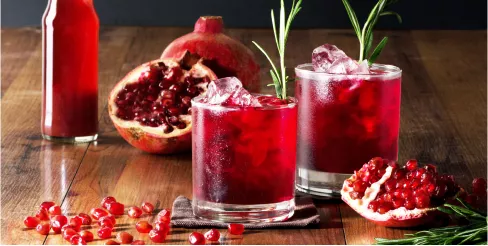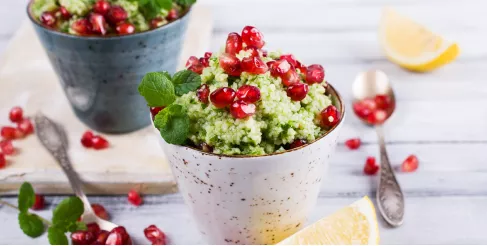Rich in antioxidants, anti-inflammatory compounds and other nutrients that can improve health and prevent
The pomegranate is an exotic fruit with a long history in culture and gastronomy. Native to the region encompassing Iran, Pakistan and India (ancient Mesopotamia), it has been cultivated and enjoyed worldwide for thousands of years.
Well known for its sweet but acidic taste, juicy interior, properties and health benefits, the pomegranate is a very popular fruit in gastronomy.
It has many small bright red seeds inside, called arils, which are separated by thin white membranes. The arils, what we could consider the pulp of the pomegranate, are edible.
It is a round fruit, about 5-12 cm in diameter, with a thick, hard, reddish or yellowish skin. It is the fruit of the pomegranate tree (Punica granatum), which can grow up to 6 metres in height.
Eating pomegranates regularly can help improve digestion and reduce the symptoms of digestive problems and disorders such as inflammatory bowel disease.
It is a fruit with a long history, as it has been grown for more than 4,000 years. The Greeks and Romans considered it a symbol of prosperity and fertility and in Greek mythology, it was associated with the goddess Persephone.
Today, it is cultivated in many parts of the world, such as Asia, the Mediterranean, Africa, North and South America and Australia.
According to the FAO, the main producers of pomegranate are Iran, India, Turkey, Egypt and Spain. The area of Elche, in the province of Alicante, is known for its pomegranate plantations and is Europe’s main producer of pomegranates.
The Mollar de Elche pomegranate has some characteristics and qualities that set it apart from the rest. In fact, it is considered one of the best in the world and is the only one that has a Protected Designation of Origin.
In addition to all this, the pomegranate is an amazing fruit with a fascinating history. Let us tell you some interesting things about this exotic fruit:
Pomegranates are a good source of vitamin C, which is essential for the production of collagen in the body, helping maintain healthy skin and protecting the body from infectious diseases. It also helps strengthen the immune system and iron absorption.
It contains vitamin K, which plays an essential role in blood clotting and bone health.
It also provides vitamin E, another antioxidant that protects cells from damage caused by free radicals. This vitamin plays an important role in the protection of the cardiovascular system and in the health of the skin.
Pomegranates also contain small amounts of several B vitamins, including vitamin B6, thiamine (B1), riboflavin (B2), and folic acid (B9). These vitamins are essential for energy metabolism, the functioning of the nervous system and the formation of red blood cells.
Pomegranates offer a good dose of potassium, which is necessary for the balance of fluids in the body, muscle function and cardiovascular health.
It also contains copper, a mineral involved in the formation of red blood cells, iron metabolism and the functioning of the immune system.
In addition, it provides the manganese needed for nutrient metabolism, connective tissue formation and protection of the cells against oxidative stress.
Although in smaller quantities, pomegranates contain calcium, a mineral necessary for the health of bones and teeth, as well as for muscle contraction and blood clotting.
This fruit also contains small amounts of iron, which is essential for the production of red blood cells and the transport of oxygen in the body.
A medium pomegranate (about 200 grams) contains about 120-150 calories. However, this value may vary slightly depending on the size and maturity of the fruit.
Its sweet taste is due to its content of natural sugars. On average, a medium pomegranate can contain about 20-30 grams of sugars. These sugars are mainly fructose, which is the sugar naturally present in fruits.
It is always advisable to include pomegranates as part of a varied diet, in combination with other healthy foods. However, it should be noted that its consumption must be balanced and moderate, especially if you have a medical condition, such as diabetes, or problems related to blood sugar control.
Pomegranates are rich in antioxidants, especially polyphenols, which help fight free radicals and protect the body from the damage caused by them. These antioxidants also help prevent cardiovascular disease.
Pomegranates and their juice can help reduce blood pressure and blood cholesterol levels, thereby reducing the risk of coronary heart disease.
Pomegranate polyphenols also have anti-inflammatory properties, which help reduce inflammation in the body and prevent inflammation-related diseases such as arthritis.
Some studies suggest that the antioxidants and anti-inflammatory compounds in pomegranates may improve cognitive function and prevent neurodegenerative diseases such as Alzheimer’s.
Pomegranate juice is a delicious way to enjoy all the health benefits of this curious fruit. Like whole fruit, pomegranate juice is rich in antioxidants, anti-inflammatory compounds and other nutrients that can improve health and prevent disease.
Although pomegranate juice is generally safe and well tolerated, it is important to note that it can interact with certain medications, including some blood pressure and diabetes medications.
You should also know that it is rich in citric acid, which can cause stomach irritation in some people.
Therefore, it is advisable to consult with your doctor before including pomegranate juice in your diet if you are taking any medication or have stomach problems.
Pomegranate juice, an elixir of vitality and health, gives our body the strength of antioxidants and the vibrant flavour of nature in every sip.
Pomegranates are a versatile fruit that can be used in the preparation of various delicious desserts such as fruit salad, pomegranate ice cream and panna cotta.




